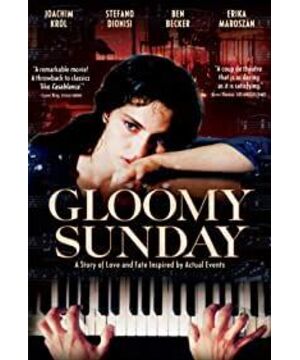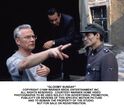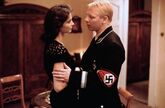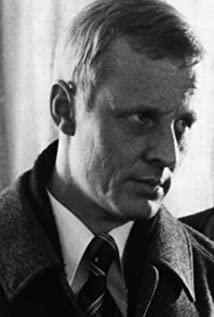"Gloomy Sunday" is a fairly complete, full story - that was my first impression of the film. The film adopts such a narrative method: starting from the sudden death of Hans at the 80th birthday party, recalling a past event, and returning to the chaotic scene of the banquet at the end of the memory. This narrative method makes the whole story tightly wrapped in the middle, without branches, compact and powerful, like a plump and round egg, seamless, and at the same time allows the audience to easily hold it in the palm of their hands and enjoy it carefully.
At this time, as far as the narrative method of the whole film is concerned, in fact, every line and every image in the film does not appear randomly, and they are correspondingly indicated at the appropriate place. This is like the two halves of parentheses, encompassing the fate of the characters, the symbolism of the image, and so on.
Once at
Andras' house, the pianist, he asked Irina to sing for him, but Irina said, "I only sing when I'm lonely, and now I don't feel lonely." This is not a simple refusal . When Hans became a German Nazi officer and returned to Budapest again, and asked Andras to play "Melancholy Sunday" for him at the Shabao restaurant, Andras resisted silently. Lena picked up the score, sang softly, and said, "Please accompany me, please?" Andras put his fingers on the keys, but the melody sounded so difficult and sad. He must have remembered what Elena had said to him: I only sing when I'm alone. At this time, Irina was not only enduring the tyranny of the Nazi officer Hans, but also suffering from Andras' misunderstanding. Her heart was full of sorrow and loneliness like this song, and was filled with helplessness and grief. When Irina finished singing and hid in the bathroom and cried, a sudden "bang" shot forcefully interrupted her grief, but made her fall into even greater pain - Andras she loves away from her. Andras clearly felt Elena's pain and understood the source of this pain, so he shot himself.
I always thought that this clear and gloomy pianist should not have left the world so quickly. However, the film made this slightly thin and sickly pianist complete the cycle of life between Yelena singing and not singing. When Elena refused to sing for him, it was not long after Andras came to the restaurant, and it was also the beginning of falling in love with Elena. As far as the film was concerned, this was the beginning of his life. However, when Elena had to endure the grief and pain of her heart and sing, who knew the grief better than Andras. He could hear the humiliation, hurt and sorrow in the song and even more. When a kind of pain can only be expressed by melody but cannot be expressed, how deep and heavy this pain is! The sensitive pianist felt this pain firsthand, so he chose to die. Perhaps as the film said through the mouth of Russ Road: he may have found some kind of message in the song.
On the second
birthday of Elena, Russlu gave her a blue hairpin, Andras wrote a tune for her, which is "Melancholy Sunday", and Hans shot for her Take a photo and tell her that today is also his birthday.
This plot is set up quite cleverly. The three birthday gifts of hairpin, music and photos almost constitute the three fulcrums of the story, and gather the story around these three things.
The film begins with a banquet scene on the 80th birthday of an old man. When he asked the violinist to play the famous song, he suddenly fell to the ground. At this time, the camera was aimed at a black and white photo of a woman; at the end of the film, We know that this old man is Hans. This photo was taken for Irina back then, and the violinist was playing "Melancholy Sunday", and then the camera cuts to a gray bun with a piece stuck on it. With a blue hairpin, a middle-aged man said to her, "Mom, happy birthday!" On
the 80th birthday of Irina, there were already no Rashilu and Andras, and Hans, who was the same age as her, also Sudden death, however, the hairpin that Russlu gave her was still pinned to the bun, Andras' "Melancholy Sunday" was still being played, and Hans's photo of her was standing there through the vicissitudes of life. Birthday gifts from decades ago are still in good condition, but the person who gave them didn't even outlive the substances. What a profound sadness this is!
The film sets the time and space in the war-torn era when the German army was stationed in Budapest. It is conceivable that in such a turbulent era, life is like a must, trampled by others, and even depends on a flash of others. How can a noble life last longer than a hairpin, a piece of music, or a photo?
When Hans became a Nazi officer and returned to Budapest, he took the opportunity to charge a high fee to help some wealthy Jews escape the clutches of the Nazis, but what about the Russ Road that rescued him from the Danube? He could do nothing but be escorted to the concentration camp train, watching the sky suddenly darken—even if Irina betrayed herself to Hans for it.
When the whole society operates only by a certain human will, human life is like a lubricant - living or dying is to make this cruel machine work better. So both the innocent death of Ruthrow and the vile life of Hans make sense - what a horrible thing!
It doesn't matter whether Hans's sudden death at the end of the film is the result of the "Devil's Invitation" - the performance of "Gloomy Sunday", or the vial of "heart-stopping medicine", whether it is an act of revenge, or It doesn't matter if the director did it on purpose for the perfection of the story. Because, at this moment, we deeply understand that life is so light and so heavy, even if you live to gray hair, you may suddenly fall to the ground and die, or you may receive the warm blessing of your child.
This narrative method is undoubtedly a step-by-step approach, which firmly grasps the hearts of the audience, but such a narrative method is too intricate. As Chekhov said: If a sword is hung in the first act, the sword must be unsheathed in the last act. This "appearing-buried (or ignored)-reappearing (playing its role)" structure manifests its integrity, clean and smooth like marble, yet life is more contingent, such The structure can make the audience fall into a mindset, less thinking about life for what it is.
View more about Gloomy Sunday reviews











